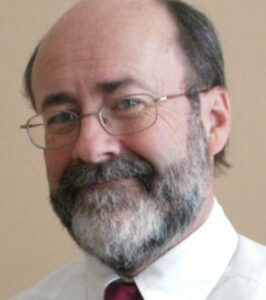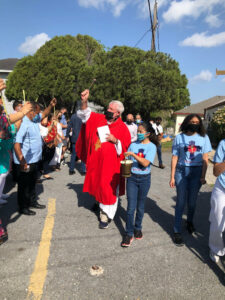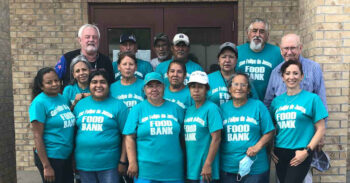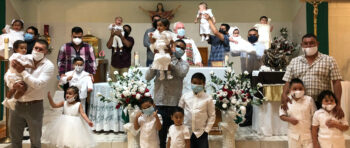This Is What An Angel Looks Like

By Michael Seifert
Cover Photo:
New Zealander, Fr Tony O’Connor-Hickman SM baptises a baby in the parish church of San Felipe in Brownsville, a town on the border between the US and Mexico. It faces the Mexican town of Matamoros, divided by the Rio Grande and by the border wall.
Fr Tony spent 12 years there, having also been on mission in Venezuela and Peru.
The parish has been at the forefront of the migrant crisis in the US border lands. Thousands of unaccompanied minors seeking safety and a better life have been detained by the US Border force. Fr Tony and his San Felipe team have cared for, and ministered to many of these children. Following is an appreciation of his ministry.
Ask one of the children residing in a Brownsville, Texas, unaccompanied minors’ shelter if they have ever met an angel and they might just say, “Yes, actually, an older fellow with white hair and a big belly and a bigger laugh who brought us into his church and fed us pizza and soft drinks even though the shelter staff told him that he couldn’t do that.”
Ask the same question of someone living in Cameron Park, the large neighbourhood in north Brownsville and they might answer, “Ah yes, the priest who walks up and down our streets and says hello to anyone and everyone and who will get your rent paid if need be and always has some fruit and canned goods if you need some food to get by on.”

Fr Tony blessing palms during Domingo de Ramos celebration, Brownsville, Texas

Padre Tony and the San Felipe volunteers outside Casa Digna (Dignity House)
There would be a different answer from families that live in the fishing villages near San Fernando, the area just south of the Rio Grande Valley, in Mexico. Their angel would be the woman that regularly shows up in a pickup truck loaded with the things that poor families particularly appreciate: shoes, school supplies, canned food, pampers and over-the-counter medications. They would not know that her angel is the same fellow, Fr. Tony O’Connor, a Marist priest who for the past 9 years has been the pastor of San Felipe de Jesus Catholic Church in north Brownsville. Fr. Tony regularly funnelled supplies to the woman who would then drive the gauntlet down the risky northern Mexican highways that run south and east from Matamoros.
Fr. Tony would not make that trip across the border, as he is an immigrant himself and did not wish to test the good graces of the confusing people in US Customs and Border Protection. All the same, the priest, a man from far away New Zealand, having spent many years working in Peru and Venezuela, had learned to recognise people in need and knew that amongst the best ways to respond to this need was to get your own hands dirty. During his time at San Felipe he engineered an enormous expansion of the food bank services, and expanded all sorts of direct assistance for people in need, even as he pastored a large parish. As he has always had a particular place in his heart for people in jail, as soon as he learned about the thousands of teenagers held in local shelters, he expanded his ministry to include them. For many of these children, the afternoon spent at Fr. O’Connor’s church would be their only time outside of the converted Walmart that had been their home for months.

A Baptism celebration
One might think that Fr. O’Connor was some sort of one-man show. That would be an entirely wrong assumption. During his years working in resource-strapped South American communities he had learned that the best way to respond to need was to have a huge team of people, working together, sharing their best efforts and their collective wisdom. A trip to San Felipe during the Food Bank distribution would be one sign of that practice in action—dozens and dozens of parishioners working long hours, all volunteers, to make sure that the goods got to where they were most needed.
If you were fortunate enough to know the fine work of the Matamoros’ based Ayundandoles a Triunfar (Helping them to Overcome), you might have visited their offices on a Tuesday morning where you would have seen a table set up and staffed by several San Felipe parishioners—part of Fr. O’Connor’s team– handing out sandwiches, cold drinks and, always a welcomed touch—pieces of cake.
All of this work is done quietly. There has been no news coverage of this goodness; Fr. O’Connor and his team shun that kind of publicity. While understandable, these days those kinds of stories, these kinds of examples of gospel kindness need to be in the public eye, not only as a consolation to the deeply damaged public heart that we all share but as an inspiration to those who might have concluded that there is no point in sharing, that the need is unending and so—what is the point?
The joy and energy that characterises Fr. O’Connor’s community is a solid counter to that argument—what other point is there in living if not to share the bread of life that we have been given, in whatever shape it might take, in whatever amount it might have been given us? And to be able to do that with those who are hungry is a gift of grace, an honour and a privilege.
Fr. O’Connor will be departing the US/Mexico border at the end of August. He will be heading home to New Zealand, leaving a large part of his heart in the Americas, a generous portion of that heart in Brownsville. He will be missed and deeply, but he leaves behind him a host of angels who will carry on the good work he was so happy to share with them.
Biblically, angels are known as messengers of God. The message that Fr. O’Connor shared with some of the most abandoned, needy people along the southern border was clear—“You are loved.” This precious gift from a good man was not confined to thoughts and prayers and preaching but were specific, generous responses to need. He will be missed.
Michael Seifert is a former Marist priest and community leader in the Rio Grande Valley of Texas for many years. He now lives in Washington, D.C.
 Entries(RSS)
Entries(RSS)